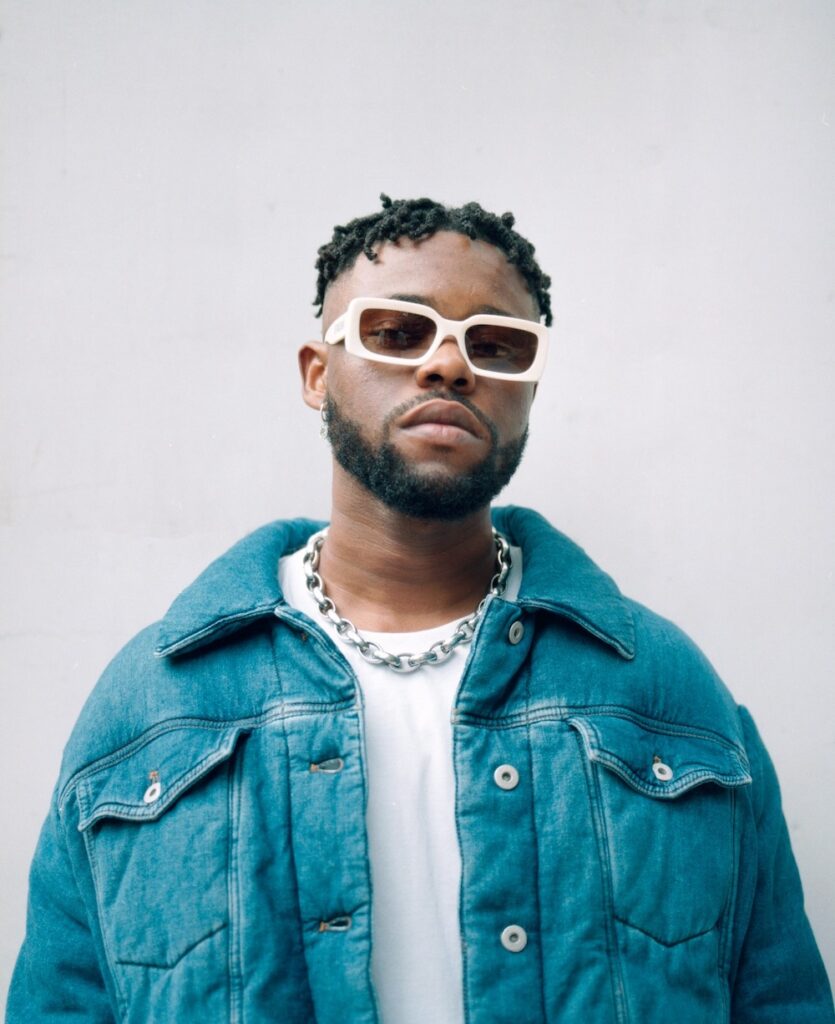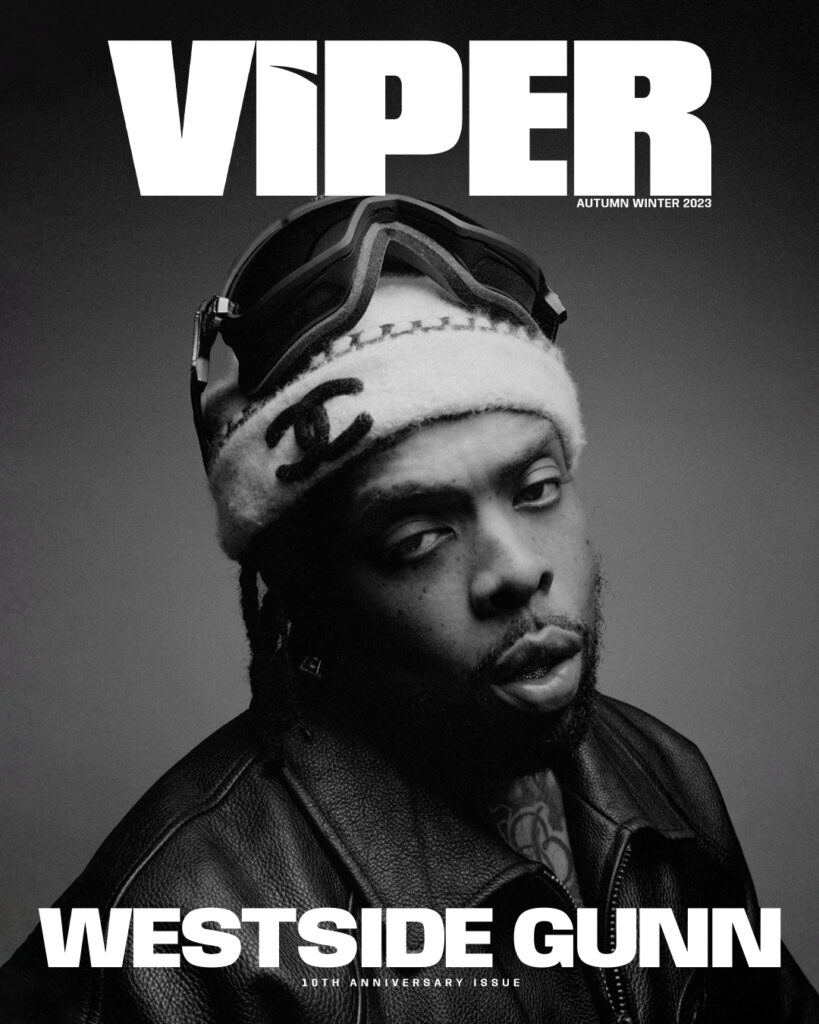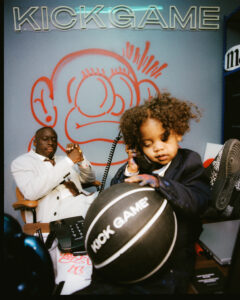The evolution of African music on the global stage has been undeniable.
This golden age of Afrobeats and Afropop has birthed several influential sounds and creative minds that the world once never expected to ever hear from. Their willingness to hone their craft and show the world just how far the genre has come is illustrated by none other than Lojay.
Lojay is a textbook student of the music game and has the catalogue to show for it. For Lojay, it’s quality over quantity – his music never fails to reflect his own personal growth, and show he is perfecting all the other aspects of music creation that contribute to his ever-evolving sound.
Viper sat down with Lojay to discuss his early influences, commercial successes and creative collaboration — all of which is ode to the incredible sound of Lojay we hear today.
Who is Lojay?
Lojay is the boy from Lagos, Nigeria with a big ass dream and a lot of will and guts to go after that dream. And [someone who] thinks about the world whilst doing it.
What is the difference between Lekan and Lojay?
Not much. My brand is me, who I am. I don’t fake or exaggerate anything. I’ve been like this before the music starting popping. I guess the biggest difference now is that I’m extroverted now because I literally have to [be].
And how has the process been for you, understanding that you need to be comfortable being uncomfortable?
I guess at some point in my life I knew [music] is what I always wanted to do, so I consciously began moulding myself into that — the aim has been to build the ultimate terminator, which I’m in the process of building [laughs].
What are your earliest memories of music?
Michael Jackson and church. I used to sit there and watch the drummer on the weekly church services…I would locate the closest chair to the drummer and I’d be the only person there as most would sit in the congregation, but I would be next to the choir. There was always this kid that would sit where nobody else sat — that was me.
As an artist, you are very genre fluid. How would you describe your sound?
My sound is soulful. Once its put together, you’re listening to a soulful song once but once you strip it of its beat, the melodies are touching your heart and the words are ringing in your ears. Things that make you, at times, question yourself.
Can you play the drums?
Yeah, I picked up those sticks around 8 [years old] and started making and feeling the sound it produced.
From Ikorodu to Portsmouth, what was it like studying in the UK and how did it change your relationship to music?
Studying in the UK wasn’t much of a culture shock for me as I had been to the UK growing up, so it was easy to acclimatise to what it was like. First time I came to the UK I was about 12 [years old], and it was cool. But in terms of music, I guess it did open me to new sounds; London is a very cultural mix of people and sounds. Different cultures are represented everywhere — Latin, Hip-Hop, Afrobeats, Bashment – everybody has their own sound and I heard a lot of this when at uni. University really did influence the way I made music. For example, Bashment is very edgy and raw and has a lot of comparisons to the music I make.
At what point did you take music seriously?
I was about 20 and it was sometime in June/July 2016. I had a conversation at a graduation party with a friend of mine. In my mind, I felt that life couldn’t get more closer and I had to decide on whether I wanted to be an artist or have a 9-5. The biggest fear for me was understanding the uncertainty, but at the same time, I was confident that this was for me. Never had I been in a musical space and not felt important. I just knew that if I kept working at it, at some point, something would come of it. And that even if didn’t make it make it, I would still survive better than I would with a 9-5. Even if it was a dollar more than what I would make in another job. I’ve just always had that hunger. By the following week, I was in the studio and the next day I got myself a manager. From then, it was about pinpoint focus.
‘Midnight Vibes’ was your debut EP – how do you feel that body of work was received?
To be honest, I don’t know and at that point I really didn’t care. At the time, it was never about blowing up. For me, it was about getting good and perfecting the craft. I stopped paying for studio time due to the financial strain of renting studio space. London was the only place at the time where I could access Afrobeat producers and I was in Portsmouth. So I would drive to London 2-3 times a week and miss lectures, trying to get the music out. That’s when I started producing — it came from a place of attempting perfection. The process of that one year trying to better my craft ended up being ‘Midnight Vibes’. At the point, I just needed 5 songs, my best five, that illustrated my growth. There was no promo, just about getting it out there via SoundCloud.
Describe your journey from ‘Midnight Vibes’ to ‘LV N ATTN’.
Between 2017 and 2020 it was again just about improving my craft and dropping music here and there. When I look back at it, it really did pay off. I met many people and connected with them along the way — all the people I work with today and those around me are made up of people who took a similar path of making crazy shit. It’s all part of the mission — do or die.
Did you expect ‘Monalisa’ to have the level of commercial success that the song did?
To be honest, I thought ‘Tonongo’ would be the one to blow. But when ‘Monalisa’ dropped and took off, it was okay, but not straight away. Then the song really started doing its thing and went crazy. That was one of the craziest feelings ever for a couple of reasons. Firstly, I knew that I at least had this level of talent and it was just a matter of putting in the work to ensure most songs reach that level of success. I had a conversation with Wande Coal one time and he was like, “you see that song Monalisa? You can make 500 Monalisas.” And I understood exactly what he was saying.
You’ve always been a massive fan of Chris Brown — how did the remix for ‘Monalisa’ come about and what was the experience like?
The remix came out after almost a year after it came out. We had different options initially, but the thought of what Chris Brown would do on a track like ‘Monalisa’ was [too hard to turn down]. And he came through big time.
How was it performing with him at Wireless?
Amazing. A crazy experience; wireless is one of the biggest festivals in the world. To feature on the main stage with Chris Brown was one for the books.
My favourite song from Lojay is in fact ‘Leader’, your latest track. What’s yours?
My favourite is not out, but ‘Leader’ is probably mine too. ‘Leader’ is a very different song from a creative standpoint and it means a lot of things to me right now. Even when I listen to it myself I’m like, ‘who is this guy and how can he be talking like this? How dare he!’ [laughs]. The sweetest thing about it, is that it’s not braggadocio, it is simply the truth. And then the second verse takes you somewhere else.
Do you enjoy producing as much as you do being on the vocals of tracks?
I prefer the vocals more but I also really enjoy producing. My [creative] process means that once I’ve spent 5-10 minutes on the beat, I immediately start recording. And once I start, I could be there for hours, recreating the beat as I record.
What’s the beauty of working with Sarz and how did the creative collaboration come about?
The beauty is the sync. First, I’m an independent artist, so any rumours around breaking up with Sarz or leaving the record label is not true. Me and Sarz have a really close relationship and we spent the majority of the pandemic together; we literally lived in the same house in Lagos for a year and in the UK for 2-3 months. He’s like a big brother to me. He has incredible attention to detail — you don’t always find producers who are good at their craft and have great attention to detail like Sarz. But he does this [effortlessly] whilst I’m also attempting to do the same as an artist on any given song which creates this amazing fusion by two creative perfectionists.
How would you describe the current state of African music and its influence on the global music stage?
As time passes by, I do believe African music is here to stay. I feel like [African music] is the new soul genre, [at least] what it was in the 70’s and 80’s. And one of the biggest elements of Afrobeat music is the soul, the way it makes you feel. A lot of it stems from church music, which a lot of that music came from. Now there’s a heap of culture that now comes with it — the dances, the continent, the whole black movement; it’s about empowerment that represents so much. We as artists are very fortunate to be part of the movement and push the genre forward. We’ve seen it grow [from strength to strength] and it’s crazy [to witness]. [Once upon a time] Afrobeats back-to-back was reserved for house parties or [that odd club] night dedicated to Afrobeats. Even so, you’d probably only hear the likes of Wizkid or Burna Boy. Now there’s Afrobeats everywhere in the world. Artists like Costa Titch from South Africa, there’s so many. And there is no stopping it, it’s a whole continent! Within Afrobeats, there are different sub-genres [emerging] — it’s not a spark, it’s a wildfire.
There are sounds being cooked up as we speak! Afrobeats opens the door to so many other sounds. You cannot play one Asake track — it’s a series, season after season! How can you play ‘Peace Be Until You’ without playing ‘Terminator’? Then you have to play ‘Palazzo’. Once you play Palazzo, you must play ‘Organise’. How about ‘Dupe’? Asake is not an artist, he’s a playlist, I love that guy! The crazy thing about it all is that when I was recording ‘LV N ATTN’, he used to always come to the house. That was the first time I met him. And seeing everything that’s happened since then, I’m probably the biggest Asake fan. When he would come to Sarz for beats, just before I went to sleep I’d be hearing this guys’ vibe and energy… at one point he was stripping off his shirt and I remember thinking, this guy is hungry! Asake is not going anywhere, that man has worked the hardest to get here. All that wish that man bad, you’ll be seeing him grow and it will pain all of you [laughs]! Every song he makes has soulful weight which people can connect and relate to.
Who you would you love to create music with?
Post Malone, Kanye West, Ed Sheeran, John Bellion and Tems. I’m a massive fan of Tems. Melodically, she’s in a different class. I don’t know how to explain her talent, but I can explain it sonically. If you take a song like ‘Crazy Tings’ for example, it’s an African bounce that we are all familiar with. But if you hear the melodies on that song, there’s no other Afrobeat artist that would have attacked it in such a way. I can’t explain it!
She’s created a new sub-genre of Afrobeats reminiscent of old-school R&B.
Yeah! Like Lauren Hill used to do it which has been introduced to afrobeats. Like I said, afrobeats opens the door to any sound and that’s the most beautiful thing about it. We are [currently] in a space where you can blend with any music reference. Afrobeats is like a new-born. Pop, Hip-Hop and Rock have existed for decades — Afrobeats has been around for a matter of years. It is the only genre that has come [to prominence post-millennium]. And that’s why it can piece together influences from other genres that have come before]. Asake has brought the choir, Rema introduced the Bollywood infused rap. And there’s Blaqbonez — anybody that says Hip-Hop and Rap can’t be infused with Afrobeats, well Blaqbonez has proved those people wrong. Buju too — I have a bias towards him because we’ve known each other since the beginning — that’s stew boy, the man is stewed!
You’re expected to support Davido on the AWAY festival in his adapted home of Atlanta — what are you most looking forward to?
I was recently in America and people can’t wait for it. I feel like Afrobeats has broken that barrier where only certain artists can fill the O2, for example. For a period of 5 years, Afrobeats had only a handful of artists who could break that, which is such a massive statement. Now, any artist can blow up in Nigeria and sell out the O2 in the same year and that’s crazy.
When it’s all said and done, what do you want the world to say about Lojay?
I want the world to say I was one of the greatest artists in the history of music. Not the greatest African or Afrobeats artists, one of the greatest full stop. And that I did things in music that had never been thought of before that elevated the status quo. Things that other artists would draw inspiration from.
Lojay’s ‘Canada’ featuring Kabza De Small & DJ Maphorisa is out now on all major music platforms.





